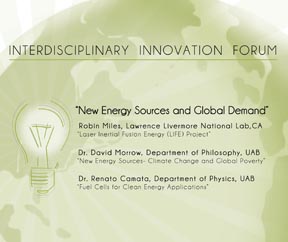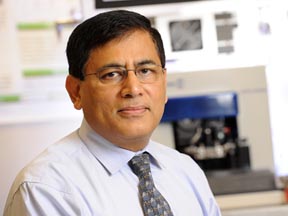The UAB College of Arts and Sciences is set to launch the Interdisciplinary Innovation Forum, a new faculty-driven effort charged with finding novel solutions to global problems and acting on them. Among the goals are to close gaps in expertise, expand the UAB research presence in emerging fields and address unmet needs.
 The inaugural forum, titled “New Energy Sources and Global Demand,” will be held at 1 p.m. Jan. 24, 2012, in the UAB Alumni House, 1301 10th Ave. South, with a reception at 12:30 p.m.
The inaugural forum, titled “New Energy Sources and Global Demand,” will be held at 1 p.m. Jan. 24, 2012, in the UAB Alumni House, 1301 10th Ave. South, with a reception at 12:30 p.m.
New energy sources have been much on the mind of several UAB faculty members, some of whom have a role in an initiative called the “Laser Inertial Fusion Energy (LIFE) Project” led by Robin Miles, the project’s target engineer at Lawrence Livermore National Lab in California. As the forum’s first speaker, she will discuss efforts to create fusion, the power of the sun, in a controlled way as an energy source. As part of the effort, a UAB research team is designing the diamond capsule that will hold the deuterium and tritium at which researchers will fire nearly 200 lasers to start the reaction.
From UAB, David Morrow, Ph.D., assistant professor in the UAB Department of Philosophy will discuss “New Energy Sources – Climate Change and Global Poverty,” while Renato Camata, Ph.D., associate professor in the Department of Physics, will speak on new ideas for fuel cells based on nanotechnology.
 The forum committee consists of 20 CAS faculty members and 10 from other UAB schools. More than a series of discussions, the forum will soon issue a call for proposals to fund five teams at $10,000 each, enabling them to gather baseline data. Further, the forum will serve as a liaison between promising teams, the UAB Research Foundation and the Birmingham Business Alliance.
The forum committee consists of 20 CAS faculty members and 10 from other UAB schools. More than a series of discussions, the forum will soon issue a call for proposals to fund five teams at $10,000 each, enabling them to gather baseline data. Further, the forum will serve as a liaison between promising teams, the UAB Research Foundation and the Birmingham Business Alliance.
“Our first forum includes presentations from by engineer, a philosopher and a physicist talking about the world’s urgent need for advances in energy, and about breakthroughs that may address them,” said Yogesh Vohra, Ph.D., associate dean for interdisciplinary and creative innovation within the CAS. “The forums are meant to foster new directions in research, and each forum ideally will serve as the starting point for collaborative efforts that persist.”